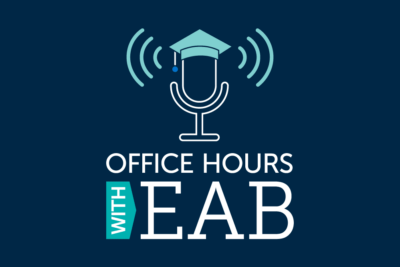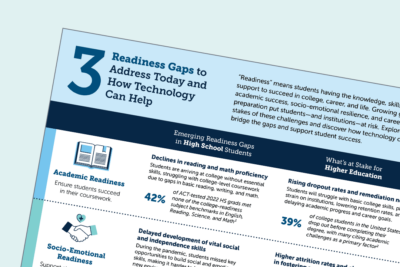Student Readiness Resource Center
This Resource Center brings together research and recommendations from across EAB and Seramount to provide K-12 schools, colleges and universities, and employers with additional insight into the readiness challenge and its implications across the student lifecycle. Explore our range of resources on academic, socioemotional, financial, and career readiness below.
Since the start of the pandemic, K-12 schools around the country have faced pervasive student readiness challenges, including chronic absenteeism, rising DFW rates, and widespread classroom disengagement. But the biggest impacts of this unfinished learning have yet to fully hit higher education. Students who were in elementary school when the pandemic began are not on pace to recover adequately by the time they reach college in the next 3-5 years. College-going rates have been declining for over a decade, and these readiness challenges at the K-12 level could further accelerate that decline.
Student readiness challenges are also beginning to impact the workforce. Employers have found early career professionals often lack the professional presence and skills necessary to succeed in the workplace. The culmination of these trends is an urgent and deepening student readiness challenge with implications for students, but also families, teachers, administrators, employers, and ultimately, communities.
-
Defining “student readiness”
We define readiness as each student having the knowledge, skills, and support needed to access and succeed in college, career, and life. Helping today’s students achieve this “readiness” will require working together across sectors to overcome academic, socioemotional, financial, and career preparedness gaps exacerbated by the disruptions of the pandemic.
Academic Readiness

Student Readiness Self-Audit

3 Strategies to address pandemic-related time management and study skill gaps

Why are students struggling in math?

Future students will need more academic support
Social and Emotional Readiness

How to Better Engage Faculty in Student Mental Health and Well-Being Support

Prime First-Year Students for Success with Resilience and Coping Skills

How schools are expanding student mental health support without hiring more counselors

Are K-12 Disruptions Forcing Higher Ed to Redefine College Readiness?
Financial Readiness

Why Students Are Opting Out of College

3 tech-enabled strategies to get ahead of FAFSA setbacks early

Recruiting 'Gen P'
Career Readiness

Bridging the Early Career Readiness Gap

Adapting Student Career Development for the Gen Z Era

How can colleges prepare Gen Z for the workforce?
